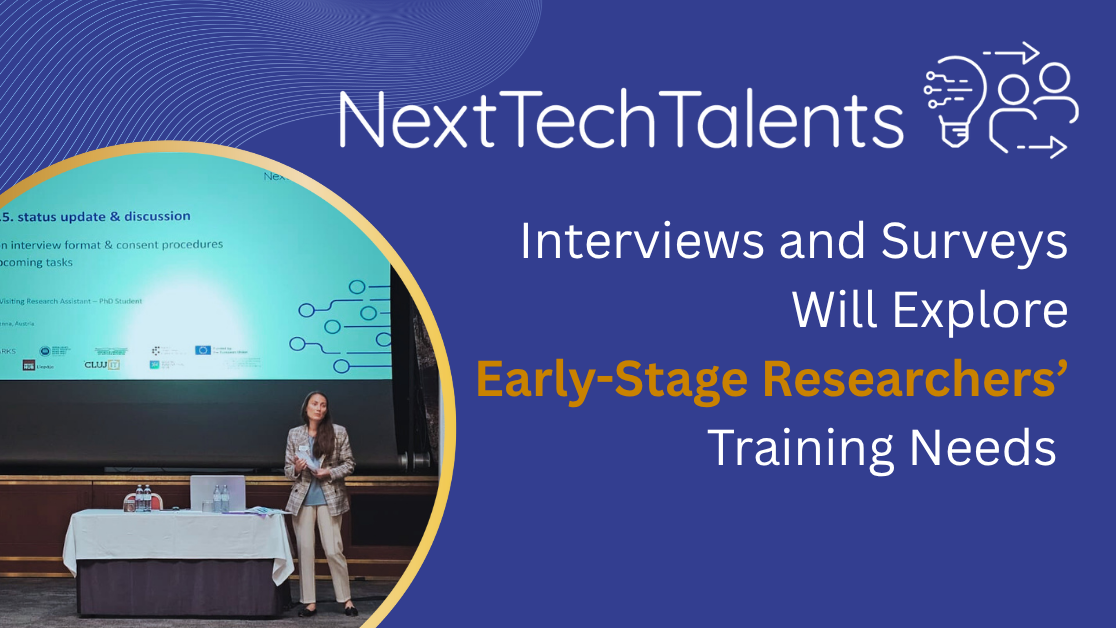
ResearchComp supports researcher career mobility across sectors in NextTechTalents
Supporting early-stage researchers means going beyond technical training. This article explores how the ResearchComp framework is guiding a European effort to embed transferable skills at the heart of career development, helping researchers navigate careers across academia, industry, and beyond.
Researchers are a fundamental resource for research and innovation and for society at large. It is important that they are equipped with the transferrable skills necessary for effective and successful careers in all relevant sectors of the society, including academia, industry, public administration and the non-profit sector. [1]
What is Research Comp?
ResearchComp is a comprehensive tool aimed at fostering the development and recognition of researchers’ transversal skills, which are critical for career mobility across different sectors. It serves three main purposes: assisting researchers in evaluating and enhancing their own skill sets, helping higher education institutions and training providers adjust their programs to meet researchers’ evolving needs, and enabling employers to better understand the diverse competences researchers possess [1]. This tool is designed to create a common framework that promotes a shared understanding of researchers’ skills, allowing stakeholders from various fields to benefit from its application on a voluntary basis.
For researchers, the framework acts as a structured tool to assess which competences they already possess and at what proficiency level, while identifying areas for further development. This self-assessment supports more targeted career planning and enhances employability across multiple sectors. Universities, research organisations, and training providers can use ResearchComp to design both initial and continuing education opportunities that align with the evolving demands of research careers and lifelong learning needs.
Employers benefit by gaining clearer insights into the wide range of skills researchers bring, making it easier to match talent to specific roles. In parallel, policymakers can use the framework to track competence development across the research ecosystem and to inform policies that promote sectoral mobility and inclusive career progression. By fostering a shared understanding of researchers’ skills, ResearchComp contributes to a more transparent and connected European research landscape, ultimately enhancing career development and socio-economic outcomes.
How is ResearchComp structured?
ResearchComp is structured around seven key competence areas that are crucial for a researcher’s success and professional development. These areas span cognitive abilities, practical research skills, and interpersonal competences. Within these areas, there are 38 specific competences and 389 learning outcomes, which are categorised across four proficiency levels: foundational, intermediate, advanced, and expert. Researchers are not expected to achieve the highest level in each competence, but rather to progress in each area over time, with support from training, practical experience, peer learning, and mentoring.
The following overview of the seven competence areas has been drafted based on the European Competence Framework for Researchers (2022) [2]:
| AREA | OVERVIEW | SKILLS |
|---|---|---|
| Managing Research | Focuses on overseeing and organising research projects, including defining objectives, creating project plans, managing resources, and ensuring the research stays on schedule and within budget. | Mobilise resources, manage projects, negotiate, evaluate research, promote open access publications. |
| Making an Impact | This area emphasises the ability to communicate research findings, contribute to societal or industrial challenges, and generate tangible outcomes from research. It involves strategic thinking, outreach, and dissemination of results. | Participate in the publication process, disseminate results, teach, increase the impact of science on policy and society, promote open innovation and transfer of knowledge. |
| Self-Management | This competence focuses on the ability to manage one's own professional development, including self-awareness, goal-setting, time management, and stress management. | Manage personal professional development, entrepreneurial spirit, self-organisation. |
| Cognitive Abilities | This area refers to the intellectual skills required to understand, analyse, and apply knowledge in different research contexts. Researchers must demonstrate the ability to process complex information and think critically and creatively. | Abstract thinking, critical thinking, analytical thinking, strategic thinking, systemic thinking, problem solving, creativity. |
| Work with Others | Refers to collaborating with peers, partners, and stakeholders across various disciplines, sectors, and organisational boundaries. It focuses on teamwork, communication, and managing interdisciplinary cooperation. | Interact professionally, develop networks, work in teams, ensure wellbeing at work, build mentor-mentee relationships, promote inclusion and diversity. |
| Managing Research Tools | Encompasses the ability to use the various tools, technologies, and techniques required for research activities, such as software for data analysis, lab equipment, and databases. | Manage research data, promote citizen science, manage intellectual property rights, operate open-source software. |
| Doing Research | This competence includes the core activities related to conducting research, from generating research questions to collecting data and analysing results. It requires the researcher to be proficient in both design and execution. | Have disciplinary expertise, perform scientific and interdisciplinary research, write research documents, apply research ethics and integrity principles. |
How is NextTechTalents Integrating ResearchComp?
The NextTechTalents project places the ResearchComp framework at the core of its strategy to support early-stage researchers in developing the transversal skills necessary for diverse and sustainable careers. ResearchComp’s seven competence areas—ranging from managing research and research tools to communication, collaboration, and self-management—serve as the foundation for designing training materials, mentorship systems, and institutional support services across the project.
Throughout the project, ResearchComp is informing the design of a training system that will offer thematic modules linked to real-world research and innovation needs. These modules will address critical areas such as managing research, making an impact, working with others, and adapting to diverse professional contexts. The training content will reflect the four proficiency levels of ResearchComp, foundational to expert, enabling researchers to identify their current strengths and areas for development. Formats will range from online lectures and written guides to mentoring and peer learning opportunities, making the system flexible and accessible.
To facilitate long-term adoption and usability, the project aims to create a centralised Knowledge Hub, where all training materials, tools, and best practices will be made available. This platform will provide interactive tools to help researchers assess their skills against the ResearchComp framework, while enabling Human Resources (HR) professionals to tailor their institutional training responses. The project’s Implementation Handbook will further support this by offering practical, step-by-step guidance in different organisational contexts.
In addition, workshops and webinars are planned to engage researchers and training providers across different regions. These sessions will cover ResearchComp-related topics, promote interdisciplinary learning, and encourage career mobility across sectors.
To ensure long-term relevance and usability, NextTechTalents includes a validation and feedback process, involving researchers, HR professionals, and institutional stakeholders. Feedback will be used to optimise the training content and delivery methods over time, ensuring that they remain aligned with user needs and labour market trends. Through this evolving process, NextTechTalents aims to embed ResearchComp not just as a framework, but as a practical tool for enabling smoother career transitions, greater employability, and stronger institutional support for researchers across Europe.
References
[1] European Commission. (2023). ResearchComp: The European Competence Framework for Researchers. Available at: https://research-and-innovation.ec.europa.eu/jobs-research/researchcomp-european-competence-framework-researchers_en
[2] European Commission. European Competence Framework for Researchers. (2022). Available at: https://research-and-innovation.ec.europa.eu/system/files/2023-04/ec_rtd_research-competence-presentation.pdf
Links
https://rea.ec.europa.eu/guidance/research-careers-eu_en
https://ec.europa.eu/commission/presscorner/detail/en/ip_23_3807
https://euraxess.ec.europa.eu/
https://open-research-europe.ec.europa.eu/
Keywords
ResearchComp, Career mobility, Researchers, Skills, Academia, Industry, Policy, Competence framework, Employability


